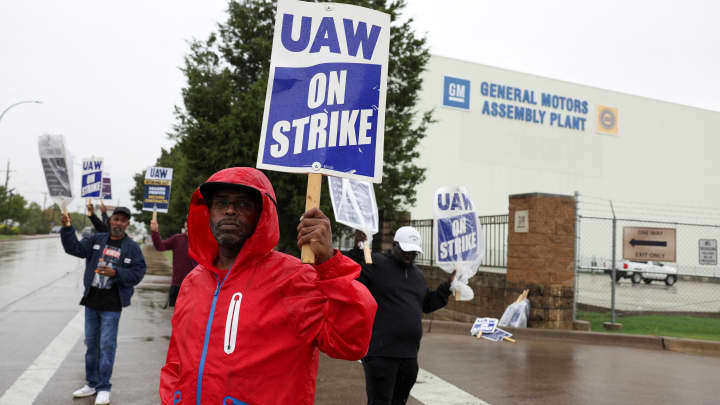
Two sources familiar with the GM-UAW talks said negotiations occurred Sunday night and into the early morning to reach an agreement. News of a deal was first reported Monday .
was the first to reach a tentative agreement with the union, on , followed by a deal with Chrysler parent on Saturday.
The 4½-year tentative agreements must still be ratified by members at each of the automakers. The headline economics of the deals, such as 25% wage increases for most workers, were patterned off Ford's initial deal.
The pact includes 25% pay increases over the terms of the agreement. The raises and benefits such as cost-of-living adjustments cumulatively raise the top wage to more than $42 an hour, including an increase of 70% for starting wages to over $30 an hour, the union said. That increase would be at least two percentage points higher than the Ford and Stellantis deals.
A UAW spokesman did not immediately respond for the difference in starting pay. However, it may be based off of cost-of-living adjustment estimates.
Those deals also reinstated cost-of-living adjustments, reduced an eight-year path to top wages to three years and allowed the right to strike over plant closures, among other significantly enhanced benefits.
The strikes have collectively cost GM, Ford and Stellantis billions of dollars in lost production. Ford said Thursday that the union's strike has cost it $1.3 billion and the deal, if ratified by members, would increase labor costs by roughly produced.
GM said Tuesday the strike had cost it about $800 million.
The proposed agreements are record-setting for the union, which was far more confrontational and strategic during the talks than in recent history.
The union initiated negotiations with all three automakers at once. This was a break from recent history when UAW leaders would bargain with each automaker individually, select a lead company to focus efforts on and then pattern the remaining deals off a leading tentative agreement.
It's not immediately clear how much the labor deals will increase labor costs for the companies, which had argued that giving in to all of the union's demands would affect their competitiveness and even long-term viability.
Deutsche Bank recently estimated the overall cost increase of the agreement at Ford to be $6.2 billion over the term of the agreement, $7.2 billion at GM, and $6.4 billion at Stellantis.
President Joe Biden, meanwhile, applauded the deals across and said he spoke with UAW President Shawn Fain on Monday.
"These record agreements reward autoworkers who gave up much to keep the industry working and going during the financial crisis more than a decade ago," Biden said at the White House. "These agreements ensure that the Big Three can still lead the world in quality and innovation."
–CNBC's Emma Kinery contributed to this article.
Don't miss these CNBC PRO stories:



